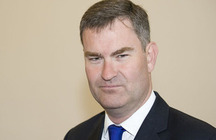David Gauke – 2018 Statement on Justice and Home Affairs Council
Below is the text of the statement made by David Gauke, the Lord Chancellor and the Secretary of State for Justice, in the House of Commons on 18 October 2018.
I attended the Justice and Home Affairs Council for Justice day on Thursday 11 October in Luxembourg.
The Council reached a general approach on the insolvency restructuring and second chance directive.
During the discussion on e-evidence legislation, Ministers agreed not to include real-time interception within the scope of the regulation and asked for further work on the extent of the obligation to notify other states when data is sought direct from a service provider. I offered to share UK experience from our bilateral discussions with the US on a data access agreement, which was welcomed by the Commission.
With regard to the draft conclusions on the application of the charter of fundamental rights in 2017, 20 member states, including the UK, supported the Netherlands proposal for the adoption of “presidency conclusions” given the lack of consensus for Council conclusions.
The director of the Fundamental Rights Agency presented his annual review of the fundamental rights situation in the European Union (EU), noting rising levels of hate crime, including anti-Semitism, and discrimination faced by immigrants and minority groups. He also referred to Roma communities living without basic amenities such as electricity and water. Member states noted these concerns.
The Commission updated Ministers on implementation of the European Public Prosecutor’s Office (EPPO). The European Council will discuss the proposal to extend the EPPO to cross-border terrorism offences.
The discussion on enhancing mutual trust focused on the importance of mutual recognition, while noting the importance of an independent judiciary and the rule of law. The UK intervened to recognise the mutual benefits of continued co-operation, and the UK’s commitment to the principle of mutual trust. The presidency will prepare conclusions on mutual trust for the December JHA Council.
The Commission presented its communication on securing free and fair European elections, including protection from personal data misuse and cyber incidents.
The Home Secretary attended Interior day.
The Commission set out ambitious plans for a stronger, more effective European Border and Coast Guard Agency (Frontex) including a standing corps of 10,000 officers, which would provide substantial support to member states in protecting the external border. Member states underlined their support for a stronger Frontex, but expressed concerns about the size of the standing corps, its impact on national authorities and the consequences for member state competence on border protection.
The Commission briefly presented the new return directive recast and member states discussed accelerated borders procedures, linking the asylum and returns processes, with asylum claims processed as close to the border as possible and, if refused, the failed asylum seeker returned fast and smoothly. Some member states focused on the need to maximise third-country co-operation on returns and readmission of own nationals. Member states were divided on the mandatory nature of the border procedures. Some member states supported manifestly unfounded claims at the border leading to an entry refusal rather than a returns decision.
Over lunch, Ministers discussed the EU’s comprehensive “whole of route” approach to tackling illegal migration. The Home Secretary focused on strengthening the EU’s response to human traffickers and smugglers advertising online, and boosting our work with African partners on economic development, strategic communications and behavioural insights to prevent migrants from starting dangerous journeys to Europe.
Ministers also discussed the balance between solidarity and responsibility. The presidency, supported by some member states, proposed broadening the idea of “solidarity” to avoid compulsory reallocation of refugees to member states who reject this, but who are content to make substantial contributions to other aspects of migration management, including external partnerships with third countries.
The Council discussed the JHA funding programmes within the next multi-annual financial framework. The UK will not participate in these programmes as a member state. The presidency called on member states to establish a strong steering structure to ensure the optimal use of funds. Member states supported provisions to step up co-operation with third countries on migration, but raised questions around flexibility and allocations to member states.
The presidency updated on progress on the files within the common European asylum system (CEAS) package. The Dublin IV proposal, as it links to the issue of solidarity and burden sharing, will be discussed among leaders at the October European Council.


